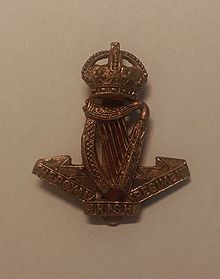Royal Irish Regiment (1684-1922)
| 18th Regiment of Foot 18th (Royal Irish) Regiment of Foot Royal Irish Regiment |
|
|---|---|

Royal Irish Regiment Cap Badge
|
|
| Active | 1684–1922 |
| Country |
|
| Branch |
|
| Type | Infantry |
| Role | Line infantry |
| Size |
2 Regular battalions |
| Garrison/HQ | Kickham Barracks, Clonmel |
| Nickname(s) | The Namurs, Paddy's Blackguards |
| Motto(s) | Virtutis Namurcensis Praemium (Reward for Valour at Namur) |
| March | Quick: Garry Owen |
| Disbanded | 1922 |
2 Regular battalions
3 Militia and Special Reserve battalions
The Royal Irish Regiment, until 1881 the 18th Regiment of Foot, was an infantry regiment of the line in the British Army, first raised in 1684. Also known as the 18th (Royal Irish) Regiment of Foot and the 18th (The Royal Irish) Regiment of Foot, it was one of eight Irish regiments raised largely in Ireland, its home depot in Clonmel. It saw service for two and a half centuries before being disbanded with the Partition of Ireland following establishment of the independent Irish Free State in 1922 when the five regiments that had their traditional recruiting grounds in the counties of the new state were disbanded.
The regiment was formed in 1684 by the Earl of Granard from independent companies in Ireland. In 1695, the regiment became known as the Royal Regiment of Ireland due to its performance at the Siege of Namur in 1695 under the direction of King William III.
The regiment saw action at the Siege of Kaiserswerth in 1702, the Battle of Schellenberg in July 1704 and the Battle of Blenheim in August 1704 during the War of the Spanish Succession. It also took part in the Battle of Ramillies in May 1706, the Battle of Oudenarde in July 1708 and the Battle of Malplaquet in September 1709.
...
Wikipedia
